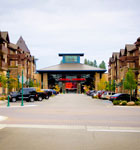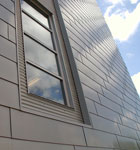At a Glance
Location
Bakersfield, CA
Founded
1998
Employees
80–120
Specialty
Innovative, high-quality, custom modular solutions
Modular buildings are hallmarks of most campuses, providing permanent, high-quality, cost-efficient solutions for schools and companies in need of additional space. And since its inception in 1998, JTS Modular, Inc. has cornered this market in Southern California.
The company, based in Bakersfield, California, was formed as an affiliate of JTS Construction, a general contractor specializing in school construction. “JTS identified a significant quality gap between what it was building as a conventional-building contractor and what modular-building manufacturers were building,” company president Phillip Engler says. “We asked ourselves why school districts would demand such high quality in their conventional buildings but accept such low quality in their modular buildings. We discovered that the answer was that school districts didn’t have a choice; there was a lack of modular manufacturers in the market building to those exacting standards.”
JTS aims to provide its clients with permanent modular structures that have the same 50-year life span and architectural, structural, mechanical, and electrical design elements of conventionally built structures. The firm also oftentimes couples its innovative work with JTS Construction to provide a complete project solution for its customers.
Top 4 Advantages of Modular Engineering in an Educational Setting
1. The school districts save 30–50 percent on construction costs because materials are used more economically and construction time is cut in half compared to conventional engineering.
2. The projects are aesthetically pleasing, oftentimes passing for conventional buildings.
3. Modular engineering incorporates and results in innovations including concrete floors, photovoltaic solar paneling, and slab-on-grade buildings, to name a few.
4. Contemporary modular construction is so high-quality that structures built using it have a 50-year lifespan equal to those done with site-built construction.
“[The difference] between modular construction and conventional construction is only in the process of construction,” vice president of sales and marketing Adam Engler says. “For us, the product is the same in either case—both in quality and aesthetics.” Modular construction also saves the owner 30–50 percent and cuts the construction time in half, he adds.
Thanks to its strong reputation, the company easily acquires both new and repeat business, working with an array of different schools across California. “The success of the company is really pretty simple,” Phillip says. “We find out what the customer really wants; customize a plan to deliver that; and keep our promises regarding quality, timeliness, and cost.”
One of the firm’s recent projects called for a partnership with JTS Construction to build a new elementary campus for 850 students in the Kerman Unified School District. The project entailed 46,000 square feet of permanent modular classrooms, a 10,000-square-foot permanent modular administration building, and a 13,000-square-foot multipurpose building. “We designed the modular buildings and matched the modular administration building to the architect’s original design,” Adam says, noting that they were able to save the school district $5 million.
JTS has also worked extensively to provide modular solutions on multiple projects for the Oro Grande School District. “Oro Grande is a perfect example of how our projects develop into long-term relationships,” Phillip says. “We consider it the highest form of compliment to be invited to do another job for a customer.”
In addition to classroom wings and other modular facilities, the company also has recently completed construction on four complete campuses. The projects included charter schools, public schools, and a community college campus, and they were completed over the span of a year, each of them ready in time for a fall 2011 opening.
Reflecting on its success in the modular field, the company says it’s most proud of the fact that many people can’t even tell its buildings are modular. “Our favorite comment—and one that we hear on nearly every job we do—is that our buildings are indistinguishable from conventional site-built structures,” Adam says. “Very often we hear, ‘I’ve been by this building so many times and would have never guessed it was a modular building.’” ABQ


